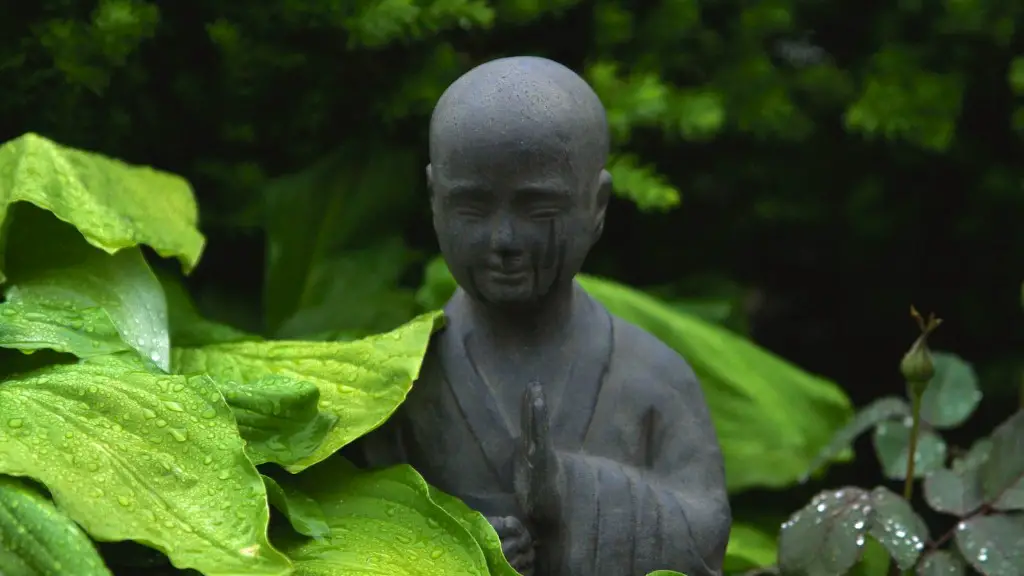Introduction
Hinduism is an ancient religion with ancient roots, and it is the world’s third-largest religion after Christianity and Islam. It is the oldest religion still practiced in India, and in many ways it is the foundation of Indian culture. Hinduism is a complex system of beliefs, rituals and traditions, and it has been an influential spiritual force in the region for centuries. The core belief of Hinduism is that there is one divine ultimate reality, Brahman, and all living things are manifestations of this reality. Hinduism is a way of life, with individuals adhering to it as part of their identity, beliefs and culture. The religion has traditionally been associated with Indian culture, and the majority of adherents live in India.
Historical Development
The origins of Hinduism are still a matter of debate among scholars, however it is generally thought that the religious tradition has been in existence for the past three to four thousand years. The Vedic period, around 1500 BCE, marks the beginning of Hinduism as documented in the Vedas, ancient scriptures from this period. The Vedic religion had various regional practices, but over time Hinduism began to crystallize in the area that is now India. During the first millennium BCE, the philosophical and religious ideas of Hinduism were further developed and refined. The rise of Buddhism and Jainism came out of this period, and the tradition incorporated aspects of these traditions as well.
Diversity and Beliefs
Hinduism is a polytheistic religion which recognizes a variety of divine and human beings. Hindus worship multiple gods and goddesses, and some of the most important include Brahma, Vishnu, and Shiva. Brahma is the creator god, Vishnu is the preserver god, and Shiva is the destroyer god. Shiva and Vishnu are often worshipped together as a divine couple. Hindus also believe in the doctrine of karma, which is the belief that our actions have consequences in this life and in the afterlife. As such, Hindus strive to live virtuous lives and do good deeds.
Influence on Indian Culture
Hinduism has had an enormous influence on Indian culture, as it has been embedded in Indian society for centuries. Hindu beliefs have shaped and influenced various aspects of Indian culture, from art, music and dance to politics, law and education. Indian culture has also been shaped by the spiritual beliefs and traditions of Hinduism, with rituals and ceremonies still forming an important part of many people’s lives. For many Hindus, their traditional religious practices and belief systems are closely integrated with their identities, values and sense of belonging.
Impact on Other Religions
Hinduism has had a profound impact on other religions. Buddhism and Jainism, two major religions found in India, were heavily influenced by Hinduism. In addition, many core ideas and beliefs of Hinduism, such as the concept of karma and reincarnation, have been taken up by other religions such as Sikhism and the Bahai faith. Furthermore, the influence of Hinduism has spread beyond India, through the spread of Indian ideals, beliefs and practices worldwide.
Significance of Asia
Hinduism is primarily associated with India and southeastern Asia. India is the birthplace of the Hindu tradition, and it has been the home of the majority of Hindus for centuries. While the Hindu tradition is found in other parts of the world, such as the United States, it is primarily a religion of South Asia. Hinduism is closely tied to Indian culture and history, as well as the spiritual and social values of the region. Thus, understanding the faith in its historical, cultural and spiritual context is essential for anyone interested in Hinduism.
The Meaning and Role of Karma
Karma is a core belief of Hinduism and is closely tied to the spiritual values of the faith. It is the belief that our actions have consequences in both this life and in the afterlife. Hindus strive to do good deeds and live virtuous lives as a means of avoiding suffering in the afterlife. Hindus also believe that through developing positive thoughts, beliefs, and actions, they can create positive karma, which can bring in joy and good fortune. For many Hindus, karma is an essential part of their spiritual practice.
The Relationship Between Religion and Society
Hinduism has traditionally been closely linked to the social and political beliefs in India. Hindu beliefs have shaped many aspects of Indian culture, especially in regards to its legal systems and social customs. The caste system has been heavily influenced by Hindu beliefs, and in many areas the legal systems are based on Hindu principles. Furthermore, many important Indian festivals, such as Diwali and Holi, are rooted in the Hindu tradition. Hinduism has been an integral part of Indian culture for centuries, and this relationship continues to this day.
Role of Temples, Rituals and Festivals
One of the essential aspects of Hinduism is its rituals and ceremonies, which are held in temples throughout India. Hindus make pilgrimages to temples to offer prayer and devotion, and ceremonies such as weddings, funerals and festivals are also held in temples. Hindu festivals such as the Diwali, Holi and Pongal are important events in the religion, and are typically celebrated with music, dance and feasting. Rituals such as puja and yajna are also integral to the Hindu tradition. Hindu temples and festivals provide an important connection to the divine, and serve as important points of contact between Hindus and their faith.
Hinduism as a Symbol of Indian Unity and Strength
Hinduism has been the foundation stone of Indian culture and is a powerful symbol of Indian unity and strength. It is a source of inspiration and understanding for millions of people, and its values of tolerance and openness are widely admired throughout the world. Despite its long history, Hinduism is still an important part of Indian life, and it remains an influential religious force in the region.
